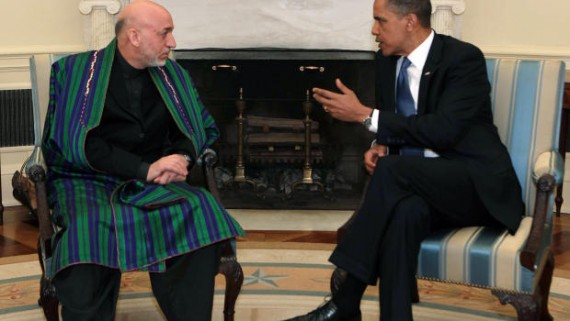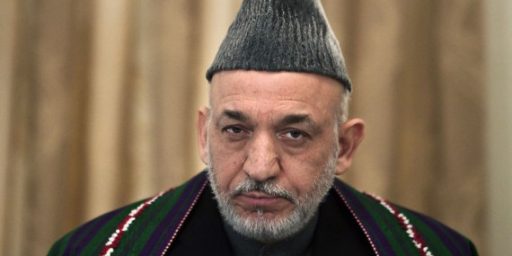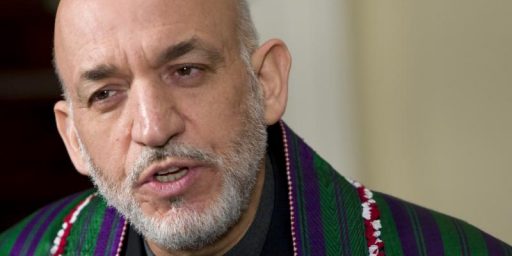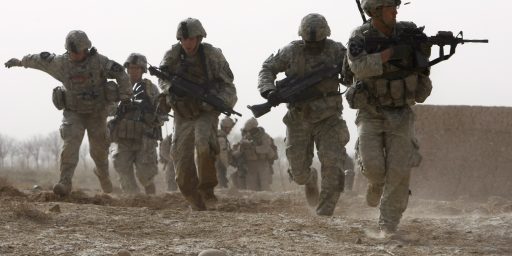White House: U.S. Will Leave Afghanistan If Karzai Balks On New Troop Deal
Hamid Karzai's refusal to sign a new security agreement may result in all U.S. troops leaving Afghanistan by the end of the year.
The United States is warning Afghan President Hamid Karzai that it will begin preparing for a full withdrawal by the end of 2014 if he fails to sign on to a security agreement that by all accounts has already been agreed to by the Afghan Parliament:
(Reuters) – U.S. President Barack Obama has told the Pentagon to prepare for the possibility that the United States will not leave behind any troops in Afghanistan after its troop drawdown at the end of this year, the White House said on Tuesday.
Obama said he had given the order to the Pentagon in a phone call on Tuesday to Afghan President Hamid Karzai, who has refused to sign a bilateral security agreement that the United States insists it must have before agreeing to leave a contingent of troops behind.
Defense Secretary Chuck Hagel was carrying the modified U.S. position to Brussels for discussion during a meeting with NATO defense ministers that starts on Wednesday.
“Specifically, President Obama has asked the Pentagon to ensure that it has adequate plans in place to accomplish an orderly withdrawal by the end of the year should the United States not keep any troops in Afghanistan after 2014,” the White House said.
The United States has held out the possibility of leaving behind in Afghanistan as many as 8,000 troops after the formal drawdown at year’s end. These troops would conduct counter-terrorism operations against al Qaeda targets and train Afghan forces.
Karzai’s refusal to sign a security deal has frustrated the White House, which has been forced to abandon an earlier demand that the Afghan president sign the deal in weeks, not months.
Staking out a new position, the White House statement said “we will leave open the possibility of concluding a BSA (bilateral security agreement) later this year. However, the longer we go without a BSA, the more challenging it will be to plan and execute any U.S. mission.”
And the longer both countries go without a security deal, “the more likely it will be that any post-2014 U.S. mission will be smaller in scale and ambition,” the White House statement said.
This little dance between Washington and Kabul has been going on for some time now. It has been several months now since the U.S. and Afghan officials supposedly completed negotiations on an agreement that would govern the presence and role of any U.S. forces that would remain in the country after the end of 2014. That agreement has been agreed to by the Afghan Parliament. However, for reasons that remain entirely unclear, the increasingly enigmatic President of Afghanistan is refusing to take the final steps necessary to ratify the agreement. More importantly, though, it is entirely unclear what exactly it is that Karzai, who was no doubt involved in the negotiations over the agreement itself, is demanding given that he hasn’t really articulated any coherent objections to the agreement. Of course, that isn’t unusual for Karzai, who has often acted quite oddly when it comes to the Afghan relationship with the United States during the time he’s been in office. This time, though, it would appear that he’s being given a deadline.
There are some similarities here with what happened in Iraq in 2011. In that particular case, the U.S. had negotiated a security agreement with Prime Minister al-Malaki that would have allowed a small training force of American troops to stay in the country past December 31st of that year, but al-Malaki was unable to get his own Parliamentary coalition to accept the agreement that he had negotiated. As a result, all American troops left Iraq by the end of 2011. Will we see a similar evacuation in Afghanistan? Only time will tell, of course, and Karzai arguably has greater reason to want a residual U.S. force to stay around than al-Malaki and his cronies did back in 2011. However, perhaps it would be best of Karzai fails to act. At least then we’d be sure that all of our forces are out of there, like they should have been a long time ago.







Here’s hoping Karzai refuses. It can’t really believe that Obama would be sad if he does.
I’ve got to say that our entire Afghanistan policy really puzzles me. Have we achieved whatever objectives we had there? If so, why are we still there? If not and we’re willing to leave without achieving our objectives, was the invasion of Afghanistan just to begin with?
@Dave Schuler:
Shoulda been 1/2 manhunt and 1/2 punitive raid, wrapped up in a year. Shoulda been, but wasn’t.
Anything that gets us out of that quagmire is OK with me.
@Dave Schuler:
Apparently it has something to do with a mythical rule that the retailer actually never had in the first place.
And yet people still seem to think Colin Powell is an honorable man despite the tons of evidence against it.
Go figure eh?
That does not support the true mission, which is to secure endless DOD funding.
@Rob in CT:
That’s what I thought and said at the time, but somehow “nation building” got wrapped up with “our sacrifice” got wrapped up with “fight them there so we don’t fight them here.” We were in a minority.
If the “fight them there so we don’t fight them here” folk now have amnesia, that’s good I guess, but it’s why we couldn’t come around to this sooner.
We should pull all our troops and tell that scumbag Karzai: “if the Taliban ever launch a terror attack against Americans, we’ll bomb your house first.”
A large numbered bank account and residency in a country that never extradite him back to Afghanistan to face electoral fraud and corruption charges?
@john personna:
To be honest, back in 2001-2002, “manhunt/punitive raid” was not my view. I’m not sure I had a clear view, and meanwhile I was freaking out over the runup to Iraq!, The Sequel.
There was this “Charlie Wilson’s War” line of thinking: by walking away from Afghanistan once the USSR pulled out, we allowed it to fester and ultimately be used against us. Thus we shouldn’t do that again. For years I largely bought that. Up for debate, of course, was the nature of our involvement (nationbuilding? Just some aid? Buy off the local warlords? What?). I didn’t think all that much about it for years, because Iraq was going on. By the time I really thought about it, we’d been there for 6 years and it was far too late to point out that nationbuilding wasn’t workable and all that.
So in a very small sense I was part of the problem.
It seems a lot of commenters here want us to go back to a policy of “benign neglect” and non-involvement with Afghanistan. I have to point out that this did not work out for us the first time we tried that , to tune of 3000 US dead in New York.
I’m not sure what precisely is the extent of our security interest in Afghanistan. But it ain’t zero. We can’t just say, “Let’s pull out and leave the crazy brown people to their own devices”. We’ve seen the end of that movie.
@stonetools:
I think we can manage to do a bit better than that. We can keep tabs on things without trying to pacify the country or turn it into a functional nation-state. I think we can make it understood that if the locals host/help jihadis who harm us, there will be hell to pay. I think we can do this without having thousands of our soldiers over there in perpetuity, no?
Also, some of it comes down to focusing on the problem. The Bush crew famously (infamously, to me) largely ignored the threat. They had other fish to fry. I don’t think we’ll be making that mistake again anytime soon.
And here’s the other thing: there are a number of “failed states” in the world. Afghanistan is only one of them. Devote too much attention to one and you might neglect the others, with fatal consequences.
We should get the hell out of Afghanistan regardless of Karzai.
He has been a lousy ally and we have better uses for the money we are wasting there.
It’s time to bring our soldiers home. If Karzai doesn’t like it, he can lump it. I don’t have
much use for Obama’s opinion on this issue, either.
@Rob in CT:
Well that’s different from emphasis of the OP (and your first comment, really). The emphasis really seemed to be to we should totally GTFO of Afghanistan and leave without a backward glance. That’s different from we should really have some kind of ongoing presence there and keep an eye on what’s going on. Inparticular, maybe having someone there might be a good thing. Electronic surviellance is great,but having an actual person on the ground is actually optimal.
@stonetools: You certainly raise a valid point, more than 1 in fact. Part of my thinking is related to my being from the Vietnam generation with family and friends who served. We have wasted American lives and treasure in every war since then and I, for one, am fed up with the stupidity we have shown ever since. We are not the world’s police force and I’m in favor of the least involvement that is safely achievable.